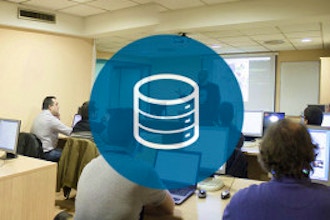Discover the Best SQL Classes in Seattle
SQL (Structured Query Language) is a versatile programming language specifically designed for managing and manipulating relational databases. It serves as the standard language for interacting with databases, enabling users to create, retrieve, update, and delete data. SQL allows users to efficiently extract meaningful insights from large datasets. By leveraging SQL's querying capabilities, individuals can retrieve specific information from databases, sort data, perform calculations, aggregate results, and join multiple tables together to generate comprehensive reports that help companies make data-informed decisions.
Those with SQL skills are in high demand in the job market, as databases are integral to virtually every organization's operations. Proficiency in SQL opens up numerous career opportunities, ranging from database administration and data analysis to software development and business intelligence. Learning SQL is an integral step for those who enjoy working with data and are interested in pursuing a lucrative data career.
Best SQL Classes & Schools in Seattle
ONLC Training Centers’ SQL Querying Fundamentals focuses on building strong foundational skills in querying databases. The course covers the basics of SQL syntax, including writing SELECT statements, filtering and sorting data, and working with SQL functions. Students will also gain an understanding of database design principles and learn how to create and modify database objects such as tables, views, and indexes. At the end of this course, students will have a grasp of SQL querying techniques and be able to confidently work with relational databases. The course is live online; however, students have access to ONLC’s downtown Seattle computer training site.
Located in downtown Seattle, General Assembly’s SQL Bootcamp is an immersive course that covers a range of essential SQL topics, including data manipulation, database design, and advanced querying techniques. Students will learn to create and manage databases, write complex SQL queries, perform data analysis, and work with multiple database management systems. The curriculum also focuses on practical skills such as optimizing queries for performance and handling large datasets.
Those looking for a SQL starter course should look no further than Noble Desktop’s SQL Level 1 class. The six-hour curriculum teaches essential SQL concepts and techniques, including creating and modifying databases, querying data, and manipulating tables. Students will be able to write basic SQL queries for Microsoft SQL Server and apply these concepts to other SQL platforms, like PostgreSQL, My SQL, and Microsoft Access. Noble’s courses are project-based, allowing students to immediately apply lessons to real-life circumstances.
NYC Career Centers offers a SQL Level I course for beginners interested in learning how to use SQL and its applications. Through a hands-on curriculum, students learn to use Microsoft SQL Server, one of the most popular database management systems, to query and manipulate data effectively. The course covers fundamental topics such as writing SQL queries to extract data from databases, filtering and sorting data, and performing basic calculations. Participants will also gain an understanding of key SQL concepts like table relationships, data integrity, and normalization.
Seattle Industries That Use SQL
Health Services
Seattle boasts a robust healthcare industry with renowned medical centers and research institutions. According to the City of Seattle’s Office of Economic Development, one in five jobs in Seattle is healthcare-related, and the industry employs over 90,000 workers. SQL is essential in managing patient data, electronic health records (EHRs), and conducting data analysis for medical research and decision-making processes.
Maritime, Manufacturing, and Logistics
Seattle's strategic location and thriving port contribute to a robust transportation and logistics industry. The Seattle area has the second most exports on the west coast, making it a key part of global trade. SQL is used for managing supply chain data, tracking shipments, optimizing routes, and analyzing transportation trends for improved efficiency.
Technology
Seattle has a bustling technology sector that has a long history of being at the forefront of technological advancement. The city is home to software development companies, tech startups, and major tech giants like Microsoft and Amazon. CompTIA, one of the IT industry’s top trade associations, recently reported that nearly 13% of the Seattle area’s workforce works in tech jobs. Tech organizations heavily rely on SQL for managing and analyzing vast amounts of data.
Aerospace
While Seattle is most notably home to Boeing Commercial Airplanes, the city is home to over 900 other aerospace firms that employ 112,000+ employees. It is no surprise, then, that Seattle has one of the largest aerospace industries in the world. SQL is used to manage manufacturing processes, supply chain data, quality control, and performance analytics.
Retail and E-commerce
Seattle is home to numerous retail and e-commerce companies, including Amazon, Nordstrom, and REI. SQL plays a vital role in managing inventory, tracking sales, customer analytics, and personalization efforts to enhance the shopping experience.
SQL Jobs & Salaries in Seattle
Data Scientist: Data scientists use SQL to access and transform data for analysis and modeling purposes. They write SQL queries to extract relevant data subsets, join and manipulate tables, and prepare data for machine learning algorithms and statistical analysis. A Data Scientist in Seattle can earn an average annual salary of $137,000.
Data Analyst: Data analysts utilize SQL to retrieve, manipulate, and analyze data from databases. They write SQL queries to extract relevant information, perform calculations, aggregate data, and generate reports and visualizations for decision-making purposes. A Seattle-based Data Analyst can earn an average annual salary of $84,000, which is higher than the national average.
Business Analyst: Business analysts use SQL to gather data from multiple sources, combine and transform it, and create meaningful insights and visualizations. They develop SQL queries and scripts to extract and manipulate data for reporting, data modeling, and building dashboards. Business analysts in Seattle earn an average salary of $89,000 annually.
Software Engineer: Software engineers are responsible for designing, developing, and maintaining software applications and systems. Software Engineers may use SQL when dealing with databases, such as integrating databases into applications, writing SQL queries to retrieve and update data, and optimizing database performance to ensure efficient data storage and retrieval within software applications. Seattle-based software engineers can earn a lucrative average salary of $134,000 per year.
Database Administrator: Database administrators (DBA) are responsible for designing, implementing, and managing databases. They use SQL to create and modify database structures, optimize query performance, and ensure data integrity and security. Database administrators earn an average annual salary of $88,000 in Seattle.
Quality Assurance Tester: Quality Assurance (QA) Testers ensure the quality and reliability of software applications through systematic testing and analysis. QA Testers may use SQL to set up and manipulate test data in databases, perform database testing to verify data integrity and accuracy and validate the interaction between the software application and the underlying database. These professionals can earn an average annual salary of $105,000.



























